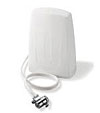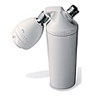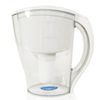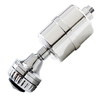 Aquasana Countertop filter |
 Aquasana Shower filter |
 Crystal Quest Pitcher |
 Crystal Quest Shower filter |
Two questions we get on a regular basis:
(1) “Do I Need a Water Filter?”
(2) “How Do I Know if I Need a Water Filter?”
Quite frankly, we kinda’ wish someone would give us a penny for each time we’ve gotten that question in an email.. We’d have a ton of cash! But we digress.
As seemingly complicated and daunting as both those questions may seem, they both have the same answer: Only testing of your water, preferably by a certified water testing laboratory, will let you know if you need a water filter…
… And even then you will need to perform occasional water tests just to make sure the quality of your water has not changed since the last test (because it can!) and/or to make certain your water filter continues to function properly.
As with any matter that could possibly have detrimental effects on your health, though, you should always get a second opinion… or in this case read what the EPA says and plans to do regarding water quality in the United States:
The Environmental Protection Agency says most people don’t need to treat their drinking water at home to make it safe. But the agency adds that a home water-treatment unit can improve water’s taste, or provide an extra margin of safety for people “more vulnerable to the effects of waterborne illness” such as infants, the elderly or those with compromised immune systems. The EPA sets standards for about 90 contaminants that can end up in drinking water supplies—from micro-organisms to herbicides and discharge from industrial-chemical factories.
For each, the agency dictates a “maximum” amount allowed, and utilities are required to treat water and issue an annual report to customers about what’s detected. (If you’re drinking from a private well, you’re on your own.)
A home-treatment device may reduce such contaminants even further. Plus, the EPA sets drinking-water standards for just a fraction of the some 15,000 chemicals used in the U.S. In December, the not-for-profit Environmental Working Group released results of a three-year analysis of 20 million tap water quality tests performed by water utilities and found some 202 currently unregulated chemicals in water supplied across the country. That included rocket-fuel component perchlorate and MTBE, a gasoline additive. Other contaminants, such as copper and lead, may be introduced through corrosion of a homeowner’s own pipes or through leaching of brass or chrome-plated faucets and fixtures. There are DIY test kits starting at about $10 that can detect some contaminants, but a thorough analysis will require a professional to collect samples and send to a private lab.
“In almost every case, the utilities comply with federal standards but that doesn’t ensure that the water is safe to drink,” says Jane Houlihan, senior vice president for research for EWG. The EPA is evaluating the health effects of more than 100 contaminants currently unregulated in drinking water, including pharmaceuticals and disinfection byproducts, for possible regulation by 2013. ( source )
So… Do you need a water filter for your tap water or well water? Again, only testing will tell and since even the EPA suspects that it may have more drinking water contaminants to monitor, well, all of us here at Water Testing Blog know that WE will keep an eye on OUR drinking water quality and suggest you do the same, too.






